#there is not a person alive whose only or best option is fast fashion
Text
the way gen z is anti capitalist in so far as they can use anti capitalist rhetoric to defend their mindless middle class consumerism. LOL
#yes i was reading the comments on a video criticizing shopping from shein#if you buy all your clothes from the mall or online you are NOT poor#buying clothes from the mall or online sre some of the least accessible ways to get clothing lol#there is not a person alive whose only or best option is fast fashion
22 notes
·
View notes
Text
ISLAM 101: 5 PILLARS OF ISLAM: ALMS AND CHARITY: FIQH OF ZAKAT IN DETAIL:
HOW IS ZAKAT PAID? (Part2)
IS IT BETTER TO GIVE ZAKAT SECRETLY OR OPENLY?
The comparative virtue of secretly and openly giving zakat or sadaqa differs according to place and time. Although it may be better, on occasions, to give openly, at other times, opting to pay secretly may provide a wiser option. Verses and hadiths elaborating on both these circumstances afford us different clues in relation to this point. For example, “To give alms in public is good, but to give charity to the poor secretly is better for you and will atone for some of your sins,” (Baqara 2:271) “Those who spend their wealth by night and day, in private and public, shall be rewarded by their Lord”(Baqara 2:274). Based on these Qur’anic statements, we ascertain the diverse benefits of secret and open charities depending on time and place. Yet, Muslim scholars have preponderantly advised an open payment of zakat while recommending the secret offering of other charities.
Though an open payment may act as an encouragement to others, a secret payment forestalls the emergence of vices, like pride, arrogance about one’s means, and showing off. A person may be able to steer clear of these vices while performing zakat, which is, after all, an imperative obligation which is supposed to be performed with the intention of purifying the wealth; however, as for sadaqa, a voluntary activity, falling prey to these vices may come more easily. It is for this reason while enumerating the seven groups of people to be shaded under the shade of the Throne, on a horrendous Day where no other shade exists, the Messenger of God also includes, “those whose left sides are oblivious to what their right sides have given (as charity).”7
Therefore, it is essential to give voluntary sadaqa or charities secretly, and for this reason, it is said that a supererogatory sadaqa given in secret is 70 times more virtuous and valuable than that which is given openly. The Noble Messenger articulated the following: “Goodness never exhausts, sins are not forgotten, and God never dies; so do as you wish.”8 Indeed God is Alive and Eternal, a Watcher and Guard over all things perpetrated. As verified by this additional declaration: “We have shown him the right path, whether he be grateful or ungrateful” (Insan 76:3). In other words, human may either nurture a profound gratitude towards the Being Who has, through innumerable ways, made him aware of His transcendent existence, or ungratefully, throw into dissipation all his privileges, including himself, by shamefully choosing the path of disgraceful rebellion.
Note that giving explicitly may involve a degree of disdain on behalf of the benefactor as s/he acquires personal insight to the needs, condition, and circumstances of the beneficiary. In addition, a hadith such as, “The hand which gives is better than the hand which receives,” might spuriously justify disdain in souls lacking full insight into the Message. But clearly, disdaining and abasing a Muslim has indubitably been decreed forbidden.
A further difficulty arises if the recipient is not known to be poor by the public—someone who has kept his/her need quiet, so to speak—in which case giving the sadaqa overtly may incur the ill-thought from both the donor and others that the recipient is accepting the donation without a genuine need. Here, then, is another example of how each act of faith becomes both an opportunity and a trial—for it is not right to indulge in such thoughts about others, and we risk rapidly and completely annulling any potential benefits to ourselves if we fail to check our tendencies to judge or criticize in this way. Thus, in order to fend of Satan’s whispers and the personal embarrassment the poor may experience, the best method remains that of our predecessors—one in which we secretively place the sadaqa in a location which is easily accessible by those in need, and then swiftly leave.
Perhaps we could make an exception for those towering spiritual figures who, by virtue of having already conquered their own egos, are not easily affected by the side-effects which plague the majority, and by whose leadership in the field of charity, many more souls might be drawn into random giving. For these noble individuals, visibility in the act of sadaqa might be appropriate. But this would certainly be an atypical situation—not a recommended practice for the average person.
Putting the Qur’anic balance into the picture, it can be ascertained that, occasionally, it is preferable to opt for an open payment of zakat, however, as mentioned earlier: “To give alms in public is good, but to give charity to the poor secretly is better for you, and will atone for some of your sins. God has knowledge of all that you do” (Baqara 2: 272). There is a balance, in other words. In similar fashion to salat (prayer) and sawm (fasting), the performance of obligatory actions is an instrument of public encouragement, as well as clearing its performer from likely incriminations. The highly potent and symbolic words of the Prophet in reference to those deliberately falling back from congregational salats were as follows: “I have contemplated leaving a deputy to lead, then burst in on those who, without excuse, fall back from salats, and set their houses ablaze.” In addition, the outer manifestation of a life of faith, of an adherence to the practice of Islam, is not a trivial matter, as verified by another hadith “Whoever performs our salat, faces our qibla (the direction turned towards during salat, towards the Sacred Ka‘ba), and eats what we slaughter is a Muslim under the guarantee of God and His Messenger.”9 In effect, the belief of a Muslim is reflected and generally understood by others in terms of the publicly performed obligatory deeds; therefore, there is benefit in offering these openly, to dispel any possible suspicion and spare witnesses from the easy temptation of judging another believer; in addition, public contributions of zakat provide an inspiration to those outside of the faith who might feel invited to submit after witnessing the all- encompassing mercy espoused by the Qur’an.
The actions of Abu Bakr and Ali, may God be pleased with t hem, who had totally comprehended the balance displayed in the Qur’an, are exemplary. The former, having had
dirhams worth of wealth, donated a quarter of it at night, another quarter at day, another quarter in secret and the last quarter in public; thus he actualized all the facets emphasized in the Qur’an. The latter openly donating his 4 dirhams, and then remarked, “O God, let this be an encouragement”; while during a secret donation, he prayed “Only for your sake my Lord.” While giving at night, he prayed again: “May my night be alight;” and during the day, he uttered, “O God illuminate my day.”10 There it is: a display of the Companions’ astounding sensitivity and their profound vitality in bringing Islam to life.
CAN DEFECTIVE PROPERTY BE GIVEN AS ZAKAT ?
The awesome balance set by Islam in all fields is also visible in the fundamentals of offering and collecting zakat. While instructing the collectors to avoid collecting the “best possession,” the benefactors are themselves encouraged to choose to give their best as an invaluable means of reaching the spiritual summit, a fact attested to by the Qur’an: “You will not attain righteousness until you spend of what you love” (Al Imran 3:92). Anas ibn Malik narrates the following in relation: “Of the Ansar (Medinan Muslims),” Abu Talha was one of the richest, and Bayruha—a garden across the Masjid al-Nabawi (the grandmosque at Medina), was his most beloved possession. The Messenger of God, on occasions, used to enter it and drink from its clean water. When the verse, “You will not attain righteousness until you spend of what you love” (Baqara 3:92) was revealed, Abu Talha went to the Prophet and proclaimed the following: “If this is what the Almighty God has decreed in His Book, then from now on Bayruha, my most prized possession, is a charity for God. I anticipate its rewards and benefits from Him alone. O Messenger of God! Do with it as you wish.” The Prophet responded delightfully, “How beautiful! This will bring a multitude of rewards and a copious recompense in the afterlife. I have heard your words on this subject, but if you ask me, divide it between your relatives,” and upon this Abu Talha divided it between his relatives.”11 Indeed, it is evident that in order to become an ideal servant of God, one must donate, for His sake, one’s most cherished items. Those who aspire to Paradise undoubtedly will present, with paramount pleasure, their best crops and produce.
In a hadith conveyed by Abu Hurayra, the Messenger of God reveals, “Whoever donates an amount equivalent to a handful of dates out of his pure earnings—and certainly God accepts only that is pure—God will take it and, just how one of you rears his foal, he will raise it to the size of a mountain.”12
Through another hadith, again transmitted by Abu Hurayra, the Prophet earnestly announced, “O humankind! God is Pure and He only accepts what is pure. God has also commanded the believers what He has commanded the Prophets, namely “O Messengers! Eat of the pure things and act with righteousness” (Mu’minun 23:51); and for the believers, “O you who believe! Eat of the good and clean things which We have provided for you, and be grateful to God, if it is He whom you worship” (Baqara 2:172).
In tandem, a person must put himself in the shoes of the recipient, and thus avoid giving substandard or defective items. The Qur’an elaborates the following caution in relation to this very fact:“…and seek not the bad (with intent) to spend of it (in charity)” (Baqara 2:267). In other words, one must be absolutely alert in preventing any illicitness, such as this has been forbidden by God, from coalescing with one’s donations—either accidentally or by virtue of neglect on our part.
Consequently, all manner of “filth” must be kept well at bay from honest and pure earnings, and the charity should be presented from the purest portion—the portion which the benefactor himself would gladly accept in the reverse scenario, were he to find himself the recipient instead. In practical terms, this means ensuring that gains are not secured through means which are, themselves, illicit; and to make certain that the offering meets the highest trade standard, in terms of both the quality of the goods and their real value.
During the blissful era of the Prophet, people used to leave bunches of dates at the Masjid al-Nabawi for the poor to eat. One day, after having seen a few defective bunches, the Prophet (upon whom be peace) pointed with his stick and said, “If the owner of this charity wished, he would have donated a finer bunch. Its owner will, in turn, be reciprocated with a similarly defective return in the afterlife.”13
WHEN IS THE MOST VIRTUOUS TIME FOR OFFERING ZAKAT ?
After having reached its nisab, a property on which a year has elapsed becomes subject to zakat. Yet, the generally prevalent practice is to offer it during the month of Ramadan. Although this remains the overall accepted routine, there are others who maintain that zakat should best be given before its deadline or during the season of harvest. All these views, certainly, are predicated upon various proofs, which can be recapitulated as follows.
PAYMENT DURING RAMADAN
The practice of giving zakat in Ramadan is by and large based on two notions—namely to benefit from the special month’s blessings, and to put a smile on the faces of the poor in preparation for Eid. While it remains essential to perform deeds within their specific time frames and in line with their particular requirements, their performance at sacred times and places, it is hoped, brings even greater rewards. For instance, offering salat at theKa‘ba or Masjid al-Nabawi is considered more valuable in comparison to other places. This isactually implied by the words of the Noble Prophet, who declared that there are only three mosques in the world that, on their own, are worth traveling to—Ka‘ba in Mecca, Masjid al-Nabawi in Medina, and Masjid al-Aqsa in Jerusalem.14
As for timing, the blessings of Ramadan are evidently manifest; it is considered the “sultan” of the other eleven months, containing a night superior to a thousand months. Therefore, completing an obligation like zakat within the parameters of Ramadan is believed to be an opportunity to greater rewards, as well as serving its prime role of relieving its benefactor from a compulsory duty in a timely, scheduled manner. Narrated by Anas ibn Malik, the ensu ing hadith alludes to this. The Prophet was asked, “What is the most virtuous fast after the fast of Ramadan?” He responded, “The fast of (the months of) Shaban, in reverence to Ramadan.” He w a s t hen asked: “Which sadaqa is of greater virtue?” And he replied, “Sadaqa given in Ramadan.”15
#allah#god#islam#muslim#quran#revert#convert#convert islam#revert islam#reverthelp#revert help#revert help team#help#islamhelp#converthelp#prayer#salah#muslimah#reminder#pray#dua#hijab#religion#mohammad#new muslim#new revert#new convert#how to convert to islam#convert to islam#welcome to islam
7 notes
·
View notes
Text
Diary of a Junebug

Giving makeovers and sweatshirts!
About ten years ago I met Amanda Bonfiglio, who was working on building a charity. A few years prior, she lost her best friend Lacey Travino after a year long battle with cancer. Amanda, a cancer survivor, first met Lacey in the hospital and the two became fast friends.
Before the two met, it was like they were from completely different worlds. Amanda lived an unassuming life for the most part, at least until she was diagnosed with leukemia at the age of nine. She lived with her parents and brother in Peace Coast Island, all who she was super close to. After her diagnosis, she went into remission a year later, only to relapse the following year. By the time she met Lacey four years later, she just had another relapse and was considering the option of a bone marrow transplant.
Meanwhile Lacey was a city girl, living a comfortable life with her mother. At the age of three she was treated for a brain tumor and in a way that kind of shaped her life. For years she never had any problems and went on living her life. Then at sixteen the cancer returned, more aggressive than before. So she went through radiation, but it wasn’t enough as surgery was still too risky. Although surgery was out, the tumor was dormant and she was in remission.
Fast forward to a year later and Lacey and her mother moved to Peace Coast Island for a change of scenery. Part of the reason why they moved to the island is because of Hope Hospital, which is known for its pediatric oncology department. There, Lacey and Amanda’s paths crossed when they became roommates at the hospital.
Around the same time, both received life changing news that would send them in different directions. Amanda successfully underwent a bone marrow transplant and has been free of cancer since then. As for Lacey, despite aggressive treatments the tumor continued to grow and there wasn’t much else to be done. After coming to terms with her prognosis, Lacey wanted to make the most out of the time she had left.
During that time, she came up with the idea of a charity for terminally ill kids. Inspired by a book series she grew up reading, Lacey wanted to be a benefactor, to help out kids who are facing similar struggles like she did with her illness. She wanted to do something that will bring them some peace mind, or maybe even hope for a better future.
Lacey’s idea involved a $100,000 check with a letter attached explaining the purpose of the gift. It’s up to the recipient to decide what to do with the money as it belongs to them with no strings attached. She and Amanda came up with the name Falling Star as their favorite activity to do together was going stargazing. One night they came across a shooting star and that’s how the name came to be.
Once Lacey got the ball rolling, she was determined to make Falling Star come to fruition. She kept a notebook to plan everything out, which her mother followed closely. About a year later, Falling Star sent its first letter out, followed by hundreds later that year.
The foundation has been running for almost ten years now and it has helped many children as well as various nonprofit charities dedicated to research. Amanda has been hard at work keeping her best friend’s legacy alive and her dedication is admirable. A few years after the foundation established, a camp called Constellation Cabins was built as a retreat for kids living with terminal or chronic illnesses. It’s open all year and busiest during the summer - the majority of the staff being recipients or a close loved one of a recipient whose lives were changed by Falling Star.
What keeps Amanda going is knowing that out of all the letters that get sent to kids facing what could be the end of their lives, about a quarter of them will beat the odds and survive. One of the staff members at the camp is a physical therapist who was like a success story. At sixteen, Mira Tamboli went from a star athlete to a patient in need of a heart transplant. Shortly before receiving a letter from Falling Star, her family got a call from the hospital that a donor was available. Recovery was rough and there were a few near misses, but no matter how bleak things seemed, Mira’s will to live never wavered.
Inspired by Lacey’s story, Mira became interested in the foundation. When the camp opened, she was asked to become a counselor, which she instantly accepted. That summer defined another life changing moment for Mira, one that inspired her to become a physical therapist and work as a volunteer with the kids at the camp.
Another recipient who had a similar life changing experience was Allison McKeller, an oncologist at Spectrum Memorial Children's Hospital and another volunteer at the camp. Like Mira, she was one of the first recipients, a cancer survivor who managed to beat the odds after nearly dying. Her experience inspired her to become a pediatric oncologist. She’s the one who helped organized today’s event, along with Ashleigh Wong, founder of Eve Style, a makeup line.
Ashleigh’s sister Eve was a recipient of Falling Star who passed away and she was the inspiration behind Eve Style. When her sister was hospitalized for heart problems, Ashleigh would give her makeovers to cheer her sister up. The purpose isn’t to make a terminally ill person look like a supermodel, but to help lift their self esteem and make them feel less isolated by giving them something to do, like getting ready for the day. Instead of hiding flaws like deformities, Ashleigh encourages embracing, normalizing, and accepting them in a way that makes them feel comfortable. She has been visiting various hospitals around the area, providing makeover days for patients.
And that brings us here to Hope Hospital’s pediatric oncology unit, where it all began. Amanda, Mira, Allison, and Ashleigh are all here as well as many volunteers from the camp. Along with makeovers by Ashleigh, there’s other activities like arts and crafts and games. The main thing is the fashion show, which was a lot of fun! We also gave away sweatshirts, which were designed by a volunteer - sort of like a test run for Falling Star merch - and the kids loved them!
I look forward to meeting up with Amanda and Falling Star again for another fun event in the future!
junebug|previous|ao3|next
1 note
·
View note
Text
Title: She’s an Intensely Private Person
Pairing: Troi/Riker centric
Rating: PG at worst?
Will’s perspective of “The Child,” episode 2.1
Will Riker is sure there’s not an especially delicate way to break the news of an unplanned pregnancy. It’s not in any officer training he received. For a diplomat, later it will occur to him that the captain’s announcement was unceremonious at best. And blunt.
Will is handling it all wrong, and he’s painfully aware of it before his shipmates are staring at him in surprise. He deserves Deanna’s sharp retort that it’s an even bigger surprise to her.
One look at her, and he can see how she’s holding herself stiffly. Compressing in any emotion. Constrained and with that stoic mask in place. It’s more than the emotional wall she’s carefully constructed. It occurs to him that she is sitting as far as she can from everyone else while still being in the same room.
This new ship’s doctor is bring them up to speed with detached professionalism. It’s the biggest pile of nonsensical ideas, and before any more of the words can make their way through his ears and interpret into meaning, there it is on the screen, alive and even more real.
A very clear growing fetus. Soon to be a baby. Deanna’s name and rank are displayed with Starfleet precision, and Will is struggling to figure out why they are having this conversation at all. Because while she’ll certainly have to rotate off duty in the future, he’s simply wondering how this happened at all.
There are precautions they all take, and it’s standard. Because while some families live on board, Will hasn’t heard of an unplanned pregnancy on a starship before. Or at least Deanna used to take these precautions, a sinister part of his brain reminds him that it’s not a topic that comes up in their professional discourse. He’s seen her around the ship an in Ten Forward before, but usually with Beverly or Data.
She’s an intensely private person, but she’s never hidden relationships before.
“…. We believe conception took place eleven hours ago.”
“What?” the word is out before he can hope to stop it. It’s reflexive, and certainly nothing like a professional First Officer should be reacting to a colleague. The ephemeral edges of something is starting to fit together, but Will is still trying to wrap his head around the idea that Deanna would… what? Have a relationship with someone else without him knowing? Plan a family?
She won’t meet his gaze, and Deanna clearly wants to be somewhere else altogether. Her only words have been directed at Will. And were defiant. In any other context it would be disrespect for a superior officer. But this was less like Starfleet rank or decorum and felt as charged as their lover’s quarrels.
None of it is making sense in his brain. Hours later and weeks older. And thirty six hours more until a baby, and Will can’t control his words today. It has to be asked because there aren’t any explanations, and so he asks for the one answer that he thinks should be the easiest to explain. The father.
But when she finally starts to talk for herself, she finally looks at him. And she’s talking about her sleep and a presence, and it unsettles all of them. A part of him realizes that it’s not about how they feel—Picard, Data, Worf, himself. Their ship is supposed to be safe. The safety of the crew is first. But at her most vulnerable, asleep, something had happened. And she was struggling to find words or an explanation to encompass it.
He wants explanations. Rationalization. Because how can anyone on the ship be safe—how can she be safe—if they don’t even know what or who? He’s not saying she should abort, but he wants to know the options. There are supposed to be explanations. Because she has choices, but they have a crew and ship to consider, and there’s Deanna’s health and safety, too. And yet he’s painfully aware that they have a window of time, a fast-closing window thirty six hours. And even that is an estimate for a situation that has already proved wildly unpredictable.
Leave it to Counselor Deanna Troi of the Fifth House of Betazed to put down her foot. The captain is smart enough to know she’s going to be unyielding on this point. Will wants to argue, but she gives him that look. The one that he knows means there is nothing he can say or do to change her mind.
She carries motherhood well. And Will does his best not to stare. Because she’s striking in the rich blue, and she’s settled into her usual spot on the captain’s left. For all of their shock and how washed out she was the day before, she’s glowing now.
He doesn’t begrudge her this chance at motherhood. Part of him wants to think he would be more open to it had she been in a relationship. It’s backward and smacks of something he can’t quite name. It’s old-fashioned. A small part of him finally admits that he used to imagine that someday she would look something like this while carrying their child.
But Deanna has been very busy. In less than a day Geordi helped coordinate her move to family quarters. Data had helped her organize her things. But he had bridge duty, and he has sufficiently put his foot in his mouth so much in one senior staff meeting alone that Will didn’t dare show his face.
He heard Data’s call for the security team to sickbay, and he knew. He knew she was in labor. There were protocols that Worf had already insisted upon. More than once in the meetings between the security chief, and captain, and himself Will had wanted to shake the Klignon for the imagined threats Worf had implied. The captain’s cooler head had prevailed, ultimately scaling it down to a small security team.
While he was still struggling to warm up to this new doctor, at a time when he knew Deanna would’ve far preferred Beverly Crusher, he was glad when he arrived at maternity to find the steely doctor had insisted security stand aside.
He should be in there with her.
It seems calm for a birth. There are quiet assurances from the doctor, but he can hear her effort from the door. He should be holding her hand. Encouraging her. Offering her strength. But he hasn’t been welcomed or asked. And he’s hurt her too much before and been too careless with himself to intrude on this moment. If she’s finding something good in this, he doesn’t want to interfere with these moments of joy.
The small cry hurts, though. Because he had ideas of what it might have been. If he hadn’t been so arrogant and full of his own ambitions. Will has imagined several ideas of what their children could have been. Taller like him, with her dark hair and curls. Unfathomable dark eyes full of quiet knowing. Maybe one of their children might have loved music like he did. Or inherited some smaller traces of Deanna’s empathic abilities. Or her gift for languages. And a small squeak emerges from that infant as if to highlight these last thoughts. Will wonders.
As the security detail tucks tail and exits, humbled by the sight of an ordinary baby, there’s her father’s name supplying the answer. He’s moving in now, unable to stop himself. Shifting from orbit to be drawn like gravity to her side.
And like the sun emerging after a storm, she’s smiling at him. A bigger, more open smile than he’s seen from her in a very long time. His own smile comes readily to greet it. “Were you here all along?”
He can feel her forgiveness in those five words, and Will’s smile widens as he nods. Because there’s no one whose anger is worse when it’s directed at him than Deanna’s. He’s relieved, too. That it’s a humanoid baby. That she’s safe and made it through the last days, seeming to thrive. That she’s not in pain. And she’s happy. And he has tears in his eyes.
The words are hard to get out. Because Ian is a beautiful child. And she’s never looked more beautiful to him. And he doesn’t know what to expect next, so he kisses her cheek instead. The depth and fragility of the moment is summed up in a gesture, and he feels the ghost of the connection between them for a long moment. Her understanding and thanks.
The bridge seems emptier without her. He’s never really considered it before. Because she has always been in and out with her responsibilities as counselor. But now she’s on maternity leave. While he’s heard plenty of stories of long labors and partners with hands practically crushed with the tension of a women in labor… well, hers seemed so easy and calm.
Will wants to check in her, but he has the bridge. They’re in the middle of transfers of delicate cargo. Dangerous cargo.
And it will have to wait until he’s off duty.
He’s fully cognizant that Deanna struggles with asking for help. But surely she would trust him to hold Ian for a bit or watch after the boy while she rests because he’s worked with enough new parents to know sleep can be hard to come by. He wants to confer with Dr. Pulaski to see if anyone has talked to her about a nurse to help her at night so she can still get some sleep. Knowing Deanna, she would insist she could handle it. It feels too much like interfering to go directly to the doctor, but maybe he can bring it up to Deanna later.
But later doesn’t come. Because it doesn’t take gossip long to travel around a ship, even a larger craft like the Enterprise. He hears things he doesn’t like hearing crew say about one of their own. Will is painfully aware that his past relationship, and privately tangled feelings about Deanna, make him more defensive than usual.
He can’t help but overhear the chilling call to Deanna’s quarters. Not once has he heard her this upset, and it’s worse yet because she’s always the more composed among the crew. They’ve always relied on her to steady them in times of crisis. But she has Ian clutched to her chest as though willing the boy into health. And Will is kicking himself not doing the math sooner. While this is far sooner than they ever could have predicted… had any of them considered that if Ian continued this rate of growth, a heartbreaking end was barreling toward them?
Will is frozen to the spot. He’s useless here. Nothing he can do medically to help. No solutions he can conjure for a rabbit trick. She’s struggling front of them, and he’s helpless.
They have an explanation now. It’s logical. Simple. But not harmless because of the toll it has taken on her. She’s silently falling apart, but he’s acutely aware she’s holding herself together for their sake. He wants to stay with her. To comfort her. But she’s not asked. She will grieve privately. And only after they go, and so the only compassionate thing he can do is encourage Data and Pulaski to follow. He hates leaving her to this. Set apart. Just as it began.
#star trek the next generation#troi/riker#imzadi#counselor troi#commander riker#deanna troi#will riker
0 notes
Photo
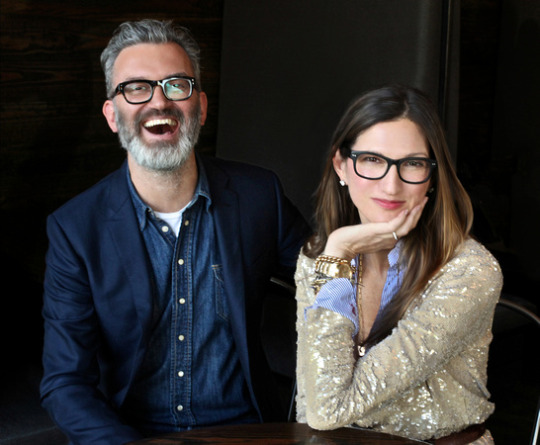
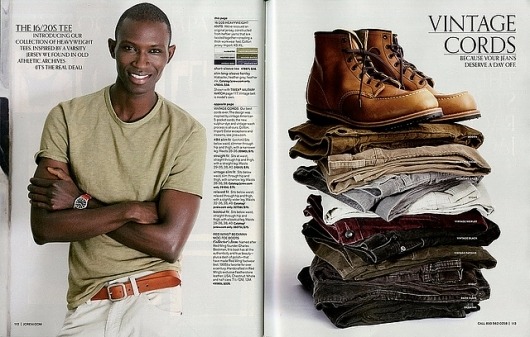

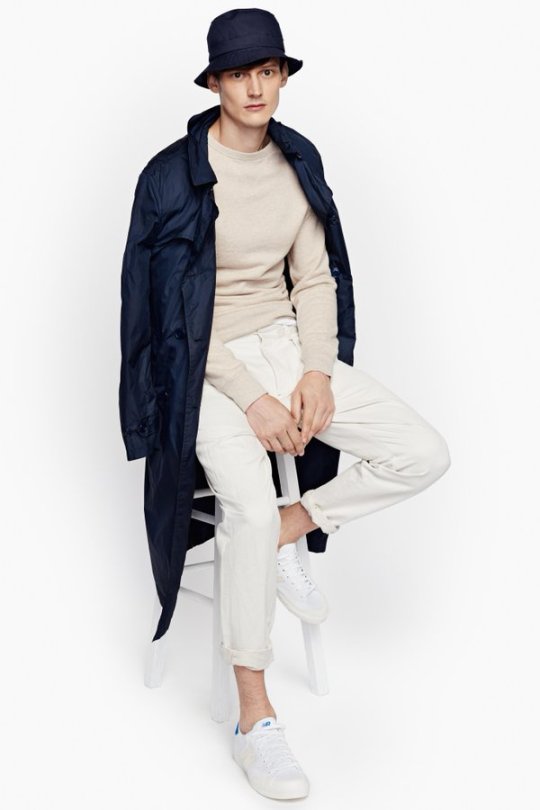

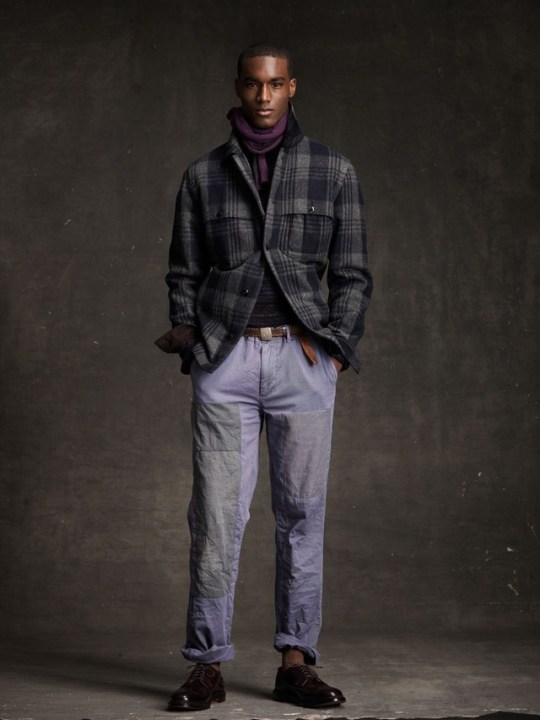


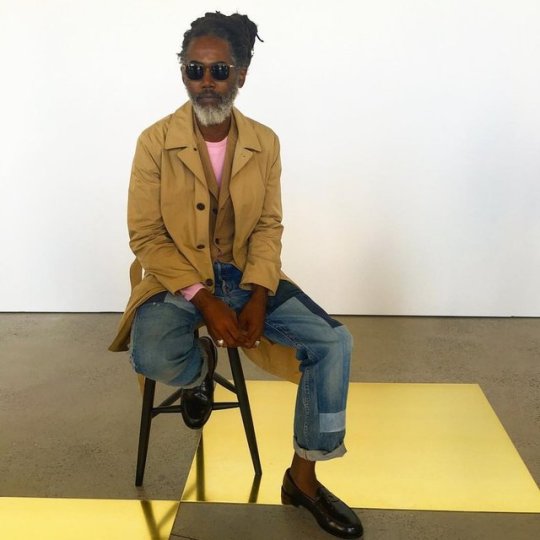

Why J. Crew is Special
J. Crew has been going through some rough and tumble times in recent years. For those who missed it, the company’s President and Creative Director, Jenna Lyons, announced earlier this week that she’ll be leaving the company by the end of the year. Technically, she’s already stepped down from her official roles, but she’s staying on as a consultant until her contract expires in December.
This is big news. Partly because Lyons has been with J. Crew for twenty-six years -- moving from a freshly minted Parsons graduate who colored in rugby designs to the creative head behind a company that’s dressed much of America. The larger reason, however, is that it possibly signals more headwinds for a label that finds itself in troubled waters.
In recent years, J. Crew has struggled to sell its brand of preppy, Americana clothing. As a result, they’ve had to take on a $2 billion debt load -- some of which will become current in 2018, making some wonder if they’ll have to file for chapter eleven. Last year, they also announced they’re closing their bridal business. This year, they’re embroiled in some lawsuits.
This is a tremendous reversal of fortunes. Along with the company’s CEO and Chairman Mickey Drexler, Lyons helped J. Crew triple its revenue from $700 million in 2003 to just short of $2 billion in 2011. And when Frank Muytjens, a former designer at Ralph Lauren, was brought aboard to head the the company’s menswear collections, the brand became a favorite of men’s style aficionados. Some readers may remember how much menswear blogs swooned over J. Crew’s seasonal presentations circa 2009-2013. Peans were sung over their first mens-only emporium -- amusingly called The Liquor Store (we were all drunk on Americana back then). And everyone wanted that red selvedge chambray shirt.
Now, few people shop there anymore. In a super, duper scientific survey I conducted on Twitter, about 60% of guys reported spending less than $100 at J. Crew in the last year (with a few commenting that their number is actually zero). About the same percentage said this is a dramatic drop from what they used to spend roughly eight to ten years ago.

So, what happened?
There’s no shortage of theories. Some say J. Crew epitomized a certain time and place in fashion -- an Americana era whose moment has mostly passed. Robin Givhan at The Washington Post uses this to explain the decline in the company’s womenswear sales, noting that women have shifted to athleisure. The story isn’t too unfamiliar for menswear, even if the takeover trend here is less clear.
It could also be that J. Crew has driven away their core customers, only to replace them with value-minded shoppers who feed on a steady diet of coupon codes. Many guys who started off with J. Crew have moved on to higher-end brands -- thanks in part to J. Crew introducing them to those labels through their “In Good Company” section. Anthropologists call this the Diderot Effect, a social phenomenon named after the French philosopher Denis Diderot, who once rued a beautiful dressing gown that he was gifted. Having owned the gown, he realized the inadequacy of his other things, which sent him plunging into debt as he shopped to replace those items. Similarly, it’s hard to go back to wearing J. Crew’s ties once you’ve owned something from Drake’s (which J. Crew sells).
The reasons for J. Crew’s troubles are most likely complicated, but if I had to pick one, my guess is that they’re not unique. Other mid-tier priced companies -- especially those with a large and expansive brick-and-mortar presence -- face similar problems. See Ralph Lauren, Abercrombie & Fitch, and the now defunct American Apparel. In fact, the only stores that seem to be doing well in today’s retail environment are the fast fashion ones (e.g. H&M and Zara, who have expanded rapidly in the last few years). And amongst Gap’s three brands, the best performer is also Old Navy, which is also their least expensive.
For the most part, it seems like the middle of the market is just getting eaten alive -- attacked by fast fashion labels down market and high-end brands upstream. If you have a budget of either $50 or $500 for a piece of clothing today, you’ll find hundreds of options -- but very little for anything in-between.


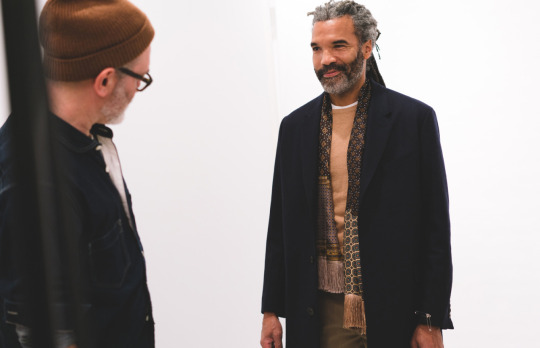
Which brings me to my point on why J. Crew is special. For guys who aren’t trying to spend the equivalent of a college tuition on their wardrobe, but also want things they won’t have to replace after a season, J. Crew is one of the best options around. They’re more affordable than Brooks Brothers or Ralph Lauren; better designed than Banana Republic or Express; and better made than Old Navy or Zara. They’re also ubiquitous, with a store in nearly every city. If you’re just starting out, or want to dress well without having to read thousands of pages on niche fashion boards, J. Crew is the simplest and easiest solution.
Will you step out of a J. Crew store looking like the most stylish person on the planet? Nope. But will you step out being better dressed than most people, without necessarily spending a fortune? Absolutely. J. Crew specializes in safe, vanilla styles that suit most Americans’ daily lives, which is what makes them great. Some of their seasonal presentations show an impressive amount of daringness (see these patchwork pants from 2010!), but their bread and butter remains in near-failsafe Americana styles that have been updated with contemporary cuts.
Some things I think are worth checking out:
Outerwear: J. Crew can be great for affordable outerwear. This field mechanic jacket is one of their perennials. The fit is flattering, the detailing is great, and it can be had for just a little more than $100 once you apply their coupon codes. One small gripe: I wish some of the outerwear could be fuller fitting. Snorkel parkas, for example, often look better when they’re oversized, but you can’t have everything.
Shirts: Some J. Crew shirts miss the mark, but the company is great with fabrics such as oxford, linen, chambray, and madras. The collars are often too skimpy to wear with a tie, but they’re great for more casual environments. Similarly, for something more casual, try one of their tees. They’re made out of exceptionally soft, cotton jerseys, which make them feel like that old, college-era favorite sitting in your closet (minus the holes and food stains).
Chinos and Jeans: J .Crew has a few fits. Their 770 model won our “Great Khakis Pants Off.” Ian, the writer behind From Squalor To Baller, is also a fan of the Bowery cut. For those who want something a little fuller fitting, check the 1040 range. They’re a little fuller through the hip and thigh, while still maintaining a bit of taper for shape.
Sweaters: The company has a better knitwear selection in the fall/ winter months (although, who doesn’t?), but in the springtime, their sweatshirts can be a nice buy. Reasonably well made for the money, although you’ll want to occasionally throw them in the dryer to shrink them back into shape. The things to avoid at J. Crew: their cashmere, which is often made from shorter fibers that easily pill, as well as the dressier cotton knits, which stretch out over time (and not something you can throw into the dryer).
Suits and Sport Coats: At this price point, it’s hard to compete with Suitsupply these days, but J. Crew is worth another look now that they’ve widened those lapels. A much more classic proportion that doesn’t make you look like you’re stuck in the Mad Men era. The Ludlow is the company’s slim fit suit, while the Crosby is a little roomier.
Wallace & Barnes: Finally, what I think is J. Crew’s hidden gem. Wallace & Barnes is a sub-line inspired by vintage clothes in the company’s design archive (think: lots of workwear from the ‘30s and ‘50s). The materials and construction here are often better than what you’ll find in the mainline. I especially like their flannels and work shirts, which you can get for as little as $25-50 once they hit sale. And like with almost everything at J. Crew, you can always bet on there being a sale.
If J. Crew actually does fold, the world of menswear will be worse for it. Uniqlo is a nice shop for uber-affordable clothes, and Mr. Porter carries almost everything high-end, but guys need a solid option in the middle of the price spectrum. Few companies occupy that space better than J. Crew.
114 notes
·
View notes
Text
3 Ways to Decide Whose Opinion of You Matters
“The most courageous act is still to think for yourself. Aloud.” ~Coco Chanel
“You know, Joui, I really like how you look tonight. I always thought your style before was… just a little wacky,” smiled Harry, a man I’d met during a forced networking meeting. He then smirked knowingly, like he was doing me a great favor.
Inside I screamed.
As a stylist one of the biggest fears my clients mention when we discuss any big change is feedback, judgment, and shame from their peers. And they are right to be fearful.
People will have commentary, trust me. But while everyone has an opinion, not everyone has a clue.
So we must be extremely careful who we let give us feedback.
I have made this mistake many times in the past. I let another person’s opinion cloud my own vision without first asking myself whether I even respect that opinion.
Like Harry, somehow just because they are a person with eyes I allow their remark to dig deep into my psyche and contort my energetic field. It feels like watching too many moving images at once.
Yes, I am sensitive. One unchecked opinion can cause me to feel ungrounded and unable to think clearly for myself.
But ultimately, this is my life. I’m the only one living behind my eyes, so I am the only one who can and should take ownership of my decisions.
So in cleansing my life recently I decided to create a set of requisites to better decide whose opinions I will let in.
I first came upon the idea in Brené Brown’s book Daring Greatly. She says that the work that scares us makes us most alive. But the more public and vocal you get, the more vulnerable you can become to outside input.
And so she created criteria for her own feedback “force field,” so to speak. Brown says “If you are not in the arena and also getting your arse kicked, I am not interested in your feedback.”
Let’s get back to Harry, for example. He made this comment during the annual BNI (Business Networking International) holiday party.
I was dropping by the BNI holiday party about a year after I ended my membership, mainly for old times sake. It was during a period of my style where I was intentionally letting go of originality and flamboyance to explore different ways of expressing my identity.
The night of the party I was in full-blown “mainstream sexy,” a pair of fitted black leggings, a classic pair of black heels, a white sweater, simple earrings. It was part identity experiment and part research project to understand women who enjoy looking this way so I could better support a broader range of style choices.
Now it was Harry’s turn to tell me how the flat-ironed, mainstream version of me was so much better than the wacky side he’d seen a year before. And let me just say, from one angle he was right.
I looked great. But sometimes looking “great” isn’t the point.
In a world of endless options, it’s more important to look like me.
This is why getting your criteria straight for whose input you let in is vital. Otherwise, it is very easy to find yourself waking up one day and not recognizing yourself because you fell into other people’s ideas of who you are instead of your own.
If you are going to allow someone to be a competent mirror for you, here are a few factors I suggest considering.
1. Is this person someone whose life’s work you admire? Is this someone with a promising, positive vision of themselves in the world? Essentially, do you love what they are up to?
2. Do you love the way this individual sees you and who you aspire to be? Are they someone who supports you and inspires you to rise to every opportunity for personal growth?
3. If this person is commenting on style, image, or branding do they have good taste? Do they have taste you admire? Have they mastered aesthetics? According to Brené Brown, are they “in the arena”?
Most importantly, trust most those people that hold you in a warm, accepting light, and have your best interests at heart.
So let’s take a moment to reflect on Harry and his opinion of my look.
1. Was Harry the epitome of style? Answer: No.
2. Was Harry the type of person I respected in work, career, life? Answer: No.
3. Was Harry the kind of person I wanted more of in my world? Answer: Once again no.
So how did I interpret Harry’s comment? Well, it did influence me in so far as I had been looking for a moment to stop experimenting in this style. His response to “Mainstream Joui” reminded me I was off.
I needed more flair. I needed to bring back a little Wacky Joui, and fast. I guess this is an example of a reverse influence.
You must carefully and consciously select the people who you actively allow to influence, judge, or cause you to feel shame.
And remember, if you are a creative, empath, artist, or any type of deeply sensitive being, be on high alert. You may be extremely vulnerable to molding yourself to those around you and what they need.
Choosing who you hang around with has the power to make or break you. You are the company you keep.
You are the opinion of those closest to you.
Chose wisely.
About Joui Turandot
Joui Turandot is a personal branding expert, for creative entrepreneurs and leaders. Joui’s philosophy draws on more than a decade of experience as a fashion designer, filmmaker, photographer, costume designer, stylist, and life coach. Joui’s podcast, Leading with Style, has been heralded as a refreshing take on the intersection between style and leadership and her first book is to be published in 2018. Visit her at jtm-consulting.net.
Web | More Posts
Get in the conversation! Click here to leave a comment on the site.
The post 3 Ways to Decide Whose Opinion of You Matters appeared first on Tiny Buddha.
from Tiny Buddha https://tinybuddha.com/blog/3-ways-to-decide-whose-opinion-of-you-matters/
0 notes
Photo

Let's start life every day again as if it were starting now. Here are the most beautiful and powerful rulers and philosophers of scientists and philosophers of life
Let's start life every day again as if it were starting now. Here are the most beautiful and powerful rulers and philosophers of scientists and philosophers of life: Life is not a number of years, but it is a number of feelings ... because life is not something other than human feeling of life. Life is not fair, so get yourself back on it. In school they teach you the lesson and then they test you, but life tests you and then teaches you the lesson. Life may shorten and may last, everything depends on the way we live. I scream to learn that you are still alive and alive and that life on this earth is possible. Life is short exile. It is not important to live but to live well. You must love life and know how to die. I love the elevator, do not use it out of laziness, but to meditate, put your finger on the button without any effort, go up or down, may hang and you are stuck in it, it is like life is not without damage, sometimes you are at the top and sometimes you. lower. Life seems to me shorter than to spend in developing hatred and recording mistakes. Life is a trust entrusted to you by the day you will not recover from you to protest because it really is not your. But the secret of life is to do the utmost. I want the student to show interest and desire to look for the answer .. You want ready answers and life is not so. Life is not something other than a sense of human life .. stripped of any human feeling of his life .. stripped of the same life in its true meaning. A nation whose people know how to die is a nation worthy of life. When we live for others, life seems long and deep, starting from the beginning of humanity, and extending after our comparison to the face of this earth. . You will learn a lot of life lessons, if you notice that the firefighters are not fighting fire with fire. Religion is the compass that helps man to maintain his proper direction in this life, and transforms him from the indignation on his face without a goal, which may expose him to fall into the clutches of evil. It does not tempt you to elevate the plain, if the slope is bumpy. Why the sheikh cries over his youth and the young man does not laugh to his grandfather! We live a double life when we live for others, and the more we multiply our sense of others, the more we feel our lives, and in the end we multiply that same life. Life Despite all this, we are required to live as it is. We learned in school as young that the empty spike raises its head in the field, and that full of wheat cuts it down, so it will not be humbled unless it is big, and it will not be arrogant but despicable. If you want to hold on to life, do not take it as a tragedy. They describe life as ignorant or oblivious to what has gone on and what is expected, and to those who exaggerate in the facts themselves and reject them in the request of the assignee. People are not interested in life and I do not see .. The length of life is not excessive, and if you lack ammunition, you will not find an asset to be a good business. This is life, so what pleases only the ignorant, and the most beautiful is the world, every day, show us ... Again, pain is a pain. Life as a paradise has closed its keys and monuments .. Those who strive to reach and who is patient up .. Winla after reaching the welcome. Do not ask me about the good nights. Life is a beautiful novel you have to read to the end .. Never stop at a sad line The end may be beautiful. For death is better for the boy than his life .. If it is not proven to command only a leader. Life has been revived, but it is free. Be from the father of the oppressor and the brave, and enter and fight, and take you into a space that protects you on a foul day. Life is useless. Life is a torch either to burn with its fire or extinguish it and live in darkness. Life has value only if we find something to fight for. When we do not know what life is, how do we know what death is! Burke filled his life with charity .. because he realized that it is shorter than to be wasted by the work of evil. Life is a fast train what a dream has passed, and what is ahead of it is illusion. Life is a dream awakened by death. Live the month of Rajab you will see wonders. Life is short, but calamities make it long. The most beautiful geometric drawing by man is to build a bridge of hope over a sea of despair and frustration. When you have inside you a voice that tells you this is valid and this is haraam, so praise your Lord for the life of your heart. Do not allow anyone to take priority in your life .. when you are a secondary option in his life. Who is satisfied with the little, will have no issues with hardships. The pain is part of life and the one who did not suffer did not know the meaning of life. Plan for your life and leave improvisation in it. Two things that you do not care about after .. Dhark for your pension and your religion for your return. The most beautiful thing in life is a person who understands you without words. Life is like a mirror, you get the best results when you smile at it. Some endings like coffee, but they make you awake, alert. Life taught me that whoever puts himself in the position of suspicion is not to blame for his misdeeds. Life taught me that when one is hardened by time, then only one knows what compassion is. Pretend that you are always okay no matter how hard your life .. Vtktman much better than the pity others. She taught me life is not love to be near you love but to love to trust that you are in the heart of the one you love. Do not despair when something does not come to you. Try again and again. Rain is digging the rock. Not by violence but by repetition. Life taught me: to make my heart a city of love and tolerance. The most beautiful geometry in life is building a bridge of hope over a sea of despair. Do not grieve if you feel life .. It is like a mother beating her son is forced! So that he learns in the coming times. Life taught us to say to ourselves before we sleep: we are not the only ones in this world and not all people are as happy as we think. Do not try to look for a dream you are and try to make the refraction situation the beginning of a new dream. Realistic Days:
Bismah must appear and that the long time of the surgeon and no matter how long the sadness in our depths must be a moment of joy Tnsenina sad days. Life taught me that when I am happy I show my joy to happier around me .. When my grief grieves my sorrow as the spring traces the fall effects. Life taught me to be as smooth as her leaves and crucified like roots and rough as a leg and sweet as perfume. But the secret of life is to do the utmost. The world is the most beautiful of the meeting and the hardest part of the separation but the anniversary is Rabat. Life taught me .. To be like the fertile soil I give the one who sows in his fruit without waiting for. Our lives are just memories of the day .. Chronicle of events .. And our days are recorded memories and unfortunately recorded wounds. Life taught me to meet good and good, to meet evil with good, to meet charity with charity, and to meet abuse with charity. No one has a "rosy life" nor an empty heart or a light head of burden. But there are those who call God and smile! thank God ever and forever.
wallpaper cute animals drawings cute animals videos cute animals cartoon cute animals to draw cute animals list cute animals pictures cute wild animals baby animals names photo model fashion fashionweek photographer popularphoto hairstylist makeup instagood bestoftheday photooftheday day likes good female world beauty art style photos amazing bride travel camera canon nikon vacation happy farm love nature naturelovers hd for #photo #model #fashion #fashionweek #photographer #popularphoto #hairstylist #makeup #instagood #bestoftheday #photooftheday #day #likes #good #female #world #beauty #art #style #photos #amazing #bride #travel #camera #canon #nikon #vacation #happy #farm #love #nature #naturelovers 2017 wallpaper cute animals drawings cute animals videos cute animals cartoon cute animals to draw cute animals list cute animals pictures cute wild animals baby animals names 2017 photo model fashion fashionweek photographer popularphoto hairstylist makeup instagood bestoftheday photooftheday day likes good female world beauty art style photos amazing bride travel camera canon nikon vacation happy farm love nature naturelovers hd for #photo #model #fashion #fashionweek #photographer #popularphoto #hairstylist #makeup #instagood #bestoftheday #photooftheday #day #likes #good #female #world #beauty #art #style #photos #amazing #bride #travel #camera #canon #nikon #vacation #happy #farm #love #nature #naturelovers cute animals drawings cute animals cartoon cute animals to draw cute animals videos cute animals pictures cute animals list cute wild animals pictures of cute baby animals
Let's start life every day again as if it were starting now. Here are the most beautiful and powerful rulers and philosophers of scientists and philosophers of life http://ift.tt/2oWtLmJ
0 notes
Text
ISLAM 101: ALMS AND CHARITY: VIRTUES OF ZAKAT: Part 17
HOW IS ZAKAT PAID?: Part 2
IS IT BETTER TO GIVE ZAKAT SECRETLY OR OPENLY?
The comparative virtue of secretly and openly giving zakat or sadaqa differ according to place and time. Although it may be better, on occasions, to give openly, at other times, opting to pay secretly may provide a wiser option. Verses and hadiths elaborating on both these circumstances afford us different clues in relation to this point. For example, “To give alms in public is good, but to give charity to the poor secretly is better for you and will atone for some of your sins,” (Baqara 2:271) “Those who spend their wealth by night and day, in private and public, shall be rewarded by their Lord”(Baqara 2:274). Based on these Qur’anic statements, we ascertain the diverse benefits of secret and open charities depending on time and place. Yet, Muslim scholars have preponderantly advised an open payment of zakat while recommending the secret offering of other charities.
Though an open payment may act as an encouragement to others, a secret payment forestalls the emergence of vices, like pride, arrogance about one’s means, and showing off. A person may be able to steer clear of these vices while performing zakat, which is, after all, an imperative obligation which is supposed to be performed with the intention of purifying the wealth; however, as for sadaqa, a voluntary activity, falling prey to these vices may come more easily. It is for this reason while enumerating the seven groups of people to be shaded under the shade of the Throne, on a horrendous Day where no other shade exists, the Messenger of God also includes, “those whose left sides are oblivious to what their right sides have given (as to a charity).”
Therefore, it is essential to give voluntary sadaqa or charities secretly, and for this reason, it is said that a supererogatory sadaqa given in secret is 70 times more virtuous and valuable than that which is given openly. The Noble Messenger articulated the following: “Goodness never exhausts, sins are not forgotten, and God never dies; so do as you wish.”8 Indeed God is Alive and Eternal, a Watcher and Guard over all things perpetrated. As verified by this additional declaration: “We have shown him the right path, whether he be grateful or ungrateful” (Insan 76:3). In other words, the human may either nurture profound gratitude towards the Being Who has, through innumerable ways, made him aware of His transcendent existence, or ungratefully, throw into dissipation all his privileges, including himself, by shamefully choosing the path of disgraceful rebellion.
Note that giving explicitly may involve a degree of disdain on behalf of the benefactor as s/he acquires a personal insight to the needs, condition, and circumstances of the beneficiary. In addition, a hadith such as, “The hand which gives is better than the hand which receives,” might spuriously justify disdain in souls lacking full insight into the Message. But clearly, disdaining and abasing a Muslim has indubitably been decreed forbidden.
A further difficulty arises if the recipient is not known to be poor by the public—someone who has kept his/her need quiet, so to speak—in which case giving the sadaqa overtly may incur the ill-thought from both the donor and others that the recipient is accepting the donation without a genuine need. Here, then, is another example of how each act of faith becomes both an opportunity and a trial—for it is not right to indulge in such thoughts about others, and we risk rapidly and completely annulling any potential benefits to ourselves if we fail to check our tendencies to judge or criticize in this way. Thus, in order to fend off Satan’s whispers and the personal embarrassment the poor may experience, the best method remains that of our predecessors—one in which we secretively place the sadaqa in a location which is easily accessible by those in need, and then swiftly leave.
Perhaps we could make an exception for those towering spiritual figures who, by virtue of having already conquered their own egos, are not easily affected by the side-effects which plague the majority, and by whose leadership in the field of charity, many more souls might be drawn into random giving. For these noble individuals, visibility in the act of sadaqa might be appropriate. But this would certainly be an atypical situation—not a recommended practice for the average person.
Putting the Qur’anic balance into the picture, it can be ascertained that, occasionally, it is preferable to opt for an open payment of zakat, however, as mentioned earlier: “To give alms in public is good, but to give charity to the poor secretly is better for you, and will atone for some of your sins. God has knowledge of all that you do” (Baqara 2: 272). There is a balance, in other words. In similar fashion to salat (prayer) and sawm (fasting), the performance of obligatory actions is an instrument of public encouragement, as well as clearing its performer from likely incriminations. The highly potent and symbolic words of the Prophet in reference to those deliberately falling back from congregational salats were as follows: “I have contemplated leaving a deputy to lead, then burst in on those who, without excuse, fall back from salats, and set their houses ablaze.” In addition, the outer manifestation of a life of faith, of an adherence to the practice of Islam, is not a trivial matter, as verified by another hadith “Whoever performs our salat, faces our qibla (the direction turned towards during salat, towards the Sacred Ka‘ba), and eats what we slaughter is a Muslim under the guarantee of God and His Messenger.”
In effect, the belief of a Muslim is reflected and generally understood by others in terms of the publicly performed obligatory deeds; therefore, there is benefit in offering these openly, to dispel any possible suspicion and spare witnesses from the easy temptation of judging another believer; in addition, public contributions of zakat provide an inspiration to those outside of the faith who might feel invited to submit after witnessing the all-encompassing mercy espoused by the Qur’an.
The actions of Abu Bakr and Ali, may God be pleased with them, who had totally comprehended the balance displayed in the Qur’an, are exemplary. The former, having had dirhams worth of wealth, donated a quarter of it at night, another quarter at day, another quarter in secret and the last quarter in public; thus he actualized all the facets emphasized in the Qur’an. The latter openly donating his 4 dirhams, and then remarked, “O God, let this be an encouragement”; while during a secret donation, he prayed “Only for your sake my Lord.” While giving at night, he prayed again: “May my night be alight;” and during the day, he uttered, “O God illuminate my day.” There it is a display of the Companions’ astounding sensitivity and their profound vitality in bringing Islam to life.
CAN DEFECTIVE PROPERTY BE GIVEN AS ZAKAT ?
The awesome balance set by Islam in all fields is also visible in the fundamentals of offering and collecting zakat. While instructing the collectors to avoid collecting the “best possession,” the benefactors are themselves encouraged to choose to give their best as an invaluable means of reaching the spiritual summit, a fact attested to by the Qur’an: “You will not attain righteousness until you spend of what you love” (Al Imran 3:92). Anas ibn Malik narrates the following in relation: “Of the Ansar (Medinan Muslims),” Abu Talha was one of the richest, and Bayruha—a garden across the Masjid al-Nabawi (the grand mosque at Medina), was his most beloved possession. The Messenger of God, on occasions, used to enter it and drink from its clean water. When the verse, “You will not attain righteousness until you spend of what you love” (Baqara 3:92) was revealed, Abu Talha went to the Prophet and proclaimed the following: “If this is what the Almighty God has decreed in His Book, then from now on Bayruha, my most prized possession, is a charity for God. I anticipate its rewards and benefits from Him alone. O Messenger of God! Do with it as you wish.” The Prophet responded delightfully, “How beautiful! This will bring a multitude of rewards and a copious recompense in the afterlife. I have heard your words on this subject, but if you ask me, divide it between your relatives,” and upon this Abu Talha divided it between his relatives. ”Indeed, it is evident that in order to become an ideal servant of God, one must donate, for His sake, one’s most cherished items. Those who aspire to Paradise undoubtedly will present, with paramount pleasure, their best crops and produce.
In a hadith conveyed by Abu Hurayra, the Messenger of God reveals, “Whoever donates an amount equivalent to a handful of dates out of his pure earnings—and certainly God accepts only that is pure—God will take it and, just how one of you rears his foal, he will raise it to the size of a mountain.”
Through another hadith, again transmitted by Abu Hurayra, the Prophet earnestly announced, “O humankind! God is Pure and He only accepts what is pure. God has also commanded the believers what He has commanded the Prophets, namely “O Messengers! Eat of the pure things and act with righteousness” (Mu’minun 23:51); and for the believers, “O you who believe! Eat of the good and clean things which We have provided for you, and be grateful to God, if it is He whom you worship” (Baqara 2:172).
In tandem, a person must put himself in the shoes of the recipient, and thus avoid giving substandard or defective items. The Qur’an elaborates the following caution in relation to this very fact:“…and seek not the bad (with intent) to spend of it (in charity)” (Baqara 2:267). In other words, one must be absolutely alert in preventing any illicitness, such as this has been forbidden by God, from coalescing with one’s donations—either accidentally or by virtue of neglect on our part.
Consequently, all manner of “filth” must be kept well at bay from honest and pure earnings, and the charity should be presented from the purest portion—the portion which the benefactor himself would gladly accept in the reverse scenario, were he to find himself the recipient instead. In practical terms, this means ensuring that gains are not secured through means which are, themselves, illicit; and to make certain that the offering meets the highest trade standard, in terms of both the quality of the goods and their real value.
During the blissful era of the Prophet, people used to leave bunches of dates at the Masjid al-Nabawi for the poor to eat. One day, after having seen a few defective bunches, the Prophet (upon whom be peace) pointed with his stick and said, “If the owner of this charity wished, he would have donated a finer bunch. Its owner will, in turn, be reciprocated with a similarly defective return in the afterlife.”
WHEN IS THE MOST VIRTUOUS TIME FOR OFFERING ZAKAT?
After having reached its nisab, a property on which a year has elapsed becomes subject to zakat. Yet, the generally prevalent practice is to offer it during the month of Ramadan. Although this remains the overall accepted routine, there are others who maintain that zakat should best be given before its deadline or during the season of harvest. All these views, certainly, are predicated upon various proofs, which can be recapitulated as follows.
PAYMENT DURING RAMADAN
The practice of giving zakat in Ramadan is by and large based on two notions—namely to benefit from the special month’s blessings, and to put a smile on the faces of the poor in preparation for Eid. While it remains essential to perform deeds within their specific time frames and in line with their particular requirements, their performance at sacred times and places, it is hoped, brings even greater rewards. For instance, offering salat at the Ka'ba or Masjid al-Nabawi is considered more valuable in comparison to other places. This is actually implied by the words of the Noble Prophet, who declared that there are only three mosques in the world that, on their own, are worth traveling to—Ka‘ba in Mecca, Masjid al-Nabawi in Medina, and Masjid al-Aqsa in Jerusalem.
As for timing, the blessings of Ramadan are evidently manifest; it is considered the “sultan” of the other eleven months, containing a night superior to a thousand months. Therefore, completing an obligation like zakat within the parameters of Ramadan is believed to be an opportunity to greater rewards, as well as serving its prime role of relieving its benefactor from a compulsory duty in a timely, scheduled manner. Narrated by Anas ibn Malik, the ensuing hadith alludes to this. The Prophet was asked, “What is the most virtuous fast after the fast of Ramadan?” He responded, “The fast of (the months of) Shaban, in reverence to Ramadan.” He was then asked: “Which sadaqa is of greater virtue?” And he replied, “Sadaqa given in Ramadan.”
#allah#god#islam#muslim#revert#reverthelp#reverthelp team#convert#new revert#new convert#new muslim#muslim revert#muslim convert#welcome to islam#revert to islam#convert to islam#how to convert islam#prophet#muhammad#quran#sunnah#hadith#dua#pray#prayer#salah#help#religion#islam101#muslimah
4 notes
·
View notes